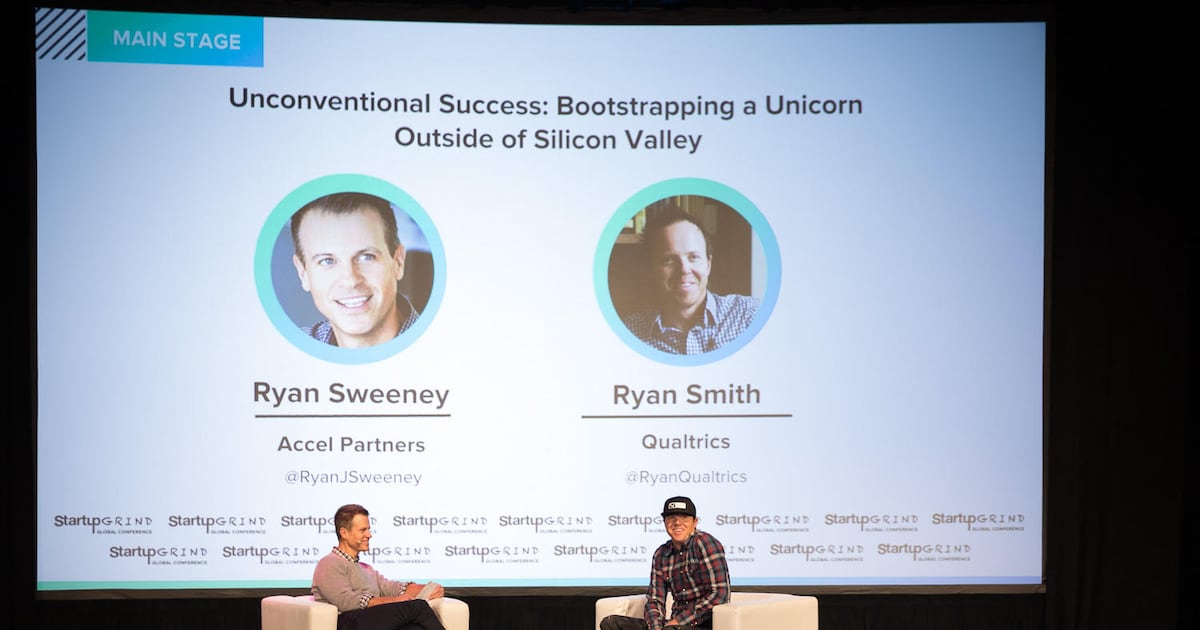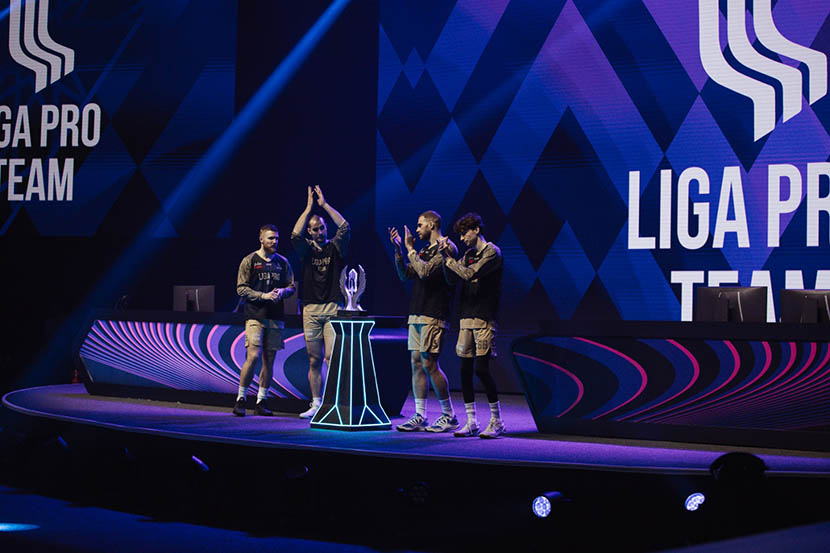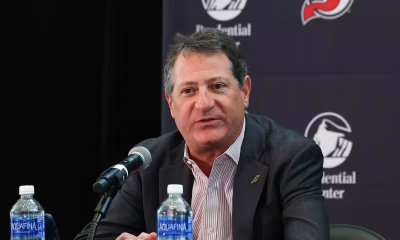- Ryan Smith and longtime partner Ryan Sweeney launch billion-dollar investment fund.
- The company aims to leverage the power of sports to propel emerging tech companies.
- The partners say Utah is well-positioned to host a booming investment franchise.
Technology
Utah Jazz owner Ryan Smith launches billion-dollar tech fund – Deseret News

The long-running relationship between Utah Jazz owner Ryan Smith and Ryan Sweeney, general partner at Bay Area venture capital giant Accel, isn’t hard to pick up on when you speak to the two 40-something tech veterans together.
In a dual interview with the Deseret News, Smith and Sweeney unveiled their ambitious new venture, Halo Experience Co, a technology-infused investment fund aiming to raise $1 billion and one built on years of friendship, shared business vision and deep roots in both tech and sports.
But contrary to some other reporting on the new fund, the Halo founders say it isn’t a sports-centric effort.
“This isn’t a sports fund,” Sweeney said. “It’s a tech fund aiming to leverage the power of sports.”
In the beginning
Smith and Sweeney first connected nearly 15 years ago through Qualtrics, the customer experience software company co-founded by Smith that famously shunned venture money for its first 10 years in business, taking pride in self-financing or “bootstrapping” growth.
But it wasn’t exactly, er, bro at first sight.
In a Deseret News interview last year, Sweeney recalled his failed early attempts to connect with Smith, leaving messages that went unanswered and generally being ignored.
“Qualtrics was a name that kept coming up over and over again from our portfolio companies that were using the product,” Sweeney said. “And everyone had the same report, they’re up to something real. We started calling on Ryan, hoping to take a meeting and get to know him. Over the course of the first year of calling, we really got no response.
“But in our world, that’s a good sign. We were being kept at bay but that just kept the chase alive.”
Smith would eventually return one of those calls from Sweeney and that led to a series of funding rounds for Qualtrics headed by Accel, representing the firm‘s first financial foray involving a business from Utah, an area that was being mostly passed over by the Bay Area titans of tech finance.
‘It’s where people are convening’
Once the Smith-Sweeney alliance was established, however, a series of mega deals soon followed.
In 2018, Qualtrics was acquired by German software behemoth SAP in an $8 billion transaction just days before a planned IPO. A few years later, Qualtrics would make it to the public investment markets via a SAP spinoff, raising over $1.5 billion and riding a $15 billion valuation.
And that was just a few weeks after Smith announced he and his wife Ashley had purchased the Utah Jazz in a deal reportedly worth about $1.7 billion, the first transaction for Smith Entertainment Group, the sports and entertainment firm founded by Ryan and Ashley Smith and backed by a personal investment from Sweeney.
SEG would go on to take a minority stake in the David Blitzer-led purchase of the Major League Soccer franchise Real Salt Lake (recently bought out by LHM) and, later, bring NHL hockey to Utah via acquisition of the Arizona Coyotes.
It’s a shared history that Smith and Sweeney say has given them a rare, front-row seat to the intersection of enterprise technology, live events and consumer behavior.
“We’ve just seen the future of this intersection of sports and tech without delineation — it’s the same,” said Smith. “Do we believe that every tech company on the planet should be in sports? F1, Super Bowl, the Masters — it’s where people are convening … it’s where business is taking place.”
Most powerful platform
Halo Experience Co, also branded as HXCO, is a new joint venture for Smith and Sweeney but will operate as a standalone effort, separate from Accel, Qualtrics, Smith Entertainment Group or any SEG-related entities, according to a spokesperson for the fund.
It will, however, enjoy backing and infrastructure support from Accel and is aiming to do more than just chase returns from emerging markets. It’s designed to help founders scale and connect with new verticals by tapping into what Smith calls “the most powerful platform on the planet” — live sports and entertainment.
“Any great tech business should want to access that market,” Sweeney said. “It’s not about riding a trend — it’s about helping great companies penetrate a uniquely high-impact space.”
From digital fan engagement to live event security, AI-powered personalization and more, the duo sees sports as the ideal proving ground for next-generation technologies.
“It’s the only form of live entertainment that matters,” Sweeney said. “It’s where people still get along, regardless of politics. There’s something beautiful in that.”
Both men stressed that while their backgrounds are steeped in tech — Accel made prescient early bets on companies like Facebook, Slack and Spotify and Smith’s Qualtrics was a record-breaking enterprise software exit — they are now uniquely positioned to capitalize on the convergence of tech innovation, media and live events.
“We just look at this from a tech angle,” Smith said. “We’re owners, we’re locked in on the other stuff. We’ve got two of the major four franchises in Utah. It’s only going to get more important.”
Smith pointed out that he and Sweeney have already been making moves in this space with investments in platforms like SeatGeek and SEG’s evolution of the fan experience, including digital ticketing, direct-to-consumer streaming and AI-powered fan engagement, as proof points.
“We’re powering business-to-business-to-consumer,” Smith said. “It’s about platform application.”
Big on bets, big on Utah
One of the outgrowths of the Smith-Sweeney relationship is a shared and avid commitment to Utah. While Smith is a proud native, Sweeney considers himself a de facto Utahn and, in speaking with the Deseret News last fall, said his optimism about the state has only grown since a company named Qualtrics popped up on his radar.
“I’m more bullish on Utah now than I was 15 years ago,” Sweeney said. “As an investor and a person. Impressed by the people, the place, the community. I’d bet on Utah all day long … and I feel like it’s still in its infancy.”
Both men said they have a desire to see the next generation of founders and investors come from Utah and the Halo fund’s mission is as much about building a legacy as it is about scaling emerging tech companies.
“There’s no reason the next great investing franchise can’t be out of Utah,” said Sweeney. “We want to build the next two or three dozen Qualtrics.”
The two noted that they’re getting set to open Halo’s Utah headquarters at a space in The Shops at South Town and are ready to take their shared “don’t blink” approach to deal-making to the next level. (Smith is building the Utah Hockey Club offices and training center at the same location.)
“It’s kind of a pinch-yourself moment,” Smith said. “We’ve been through epic rounds together, through everything — this is just the next one. We’re uniquely positioned because of our background to be a part of every conversation at the intersection of tech, pop culture, payments, live events and streaming.”
And Sweeney completed the thought on why it’s the right time and place for launching the Halo fund.
“We’ll work till we’re 85 or 90,” Sweeney said. ”We enjoy this. We’re good at it. This is what we do.”
Technology
Games of the Future Abu Dhabi 2025 Rewrites the Playbook for Sports with Phygital Innovation
Published on
December 25, 2025
By: Tuhin Sarkar

The Games of the Future Abu Dhabi 2025 have closed an unforgettable chapter in the evolution of phygital sports. Hosted under the patronage of His Highness Sheikh Mohamed bin Zayed Al Nahyan, President of the UAE, the event marked an unparalleled fusion of physical and digital competition. Over six action-packed days, Abu Dhabi hosted more than 850 participants from 60+ countries, with fierce battles across 11 disciplines including Phygital Football, Phygital Basketball, esports, Phygital Fighting, drone racing, and VR gaming.
Games of the Future Abu Dhabi 2025 was not just a sporting event; it was a vision of the future. It set a global standard for what sports can look like in the digital age, where technology and human skill come together to create immersive and multi-dimensional experiences. The competition showed the world that the future of sports isn’t confined to a physical arena, but seamlessly integrates both the physical and digital.
The Champions of Tomorrow: Phygital Sports Takes Centre Stage
The Games of the Future Abu Dhabi 2025 featured 11 disciplines that blended traditional sports with futuristic technologies, including Phygital Football, Phygital Basketball, esports, Phygital Fighting, and Phygital Shooter. These unique formats tested competitors in both the physical and digital realms. For example, Phygital Football powered by ADNOC saw the México Quetzales – Armadillos FC clinch the Phygital Football title, defeating Troncos FC 2-4 in a thrilling final that captivated crowds throughout the week. Likewise, in Phygital Basketball, the LIGA PRO TEAM triumphed in a 29-23 victory over Moscowsky.
Other high-stakes competitions included Phygital Fighting.FATAL FURY: City of the Wolves, where Kuznya dominated, winning all four of their matches. Meanwhile, xGoat emerged victorious in the Phygital Shooter.CS 2 final, overcoming Dontsu Esports 2-0 in an intense digital shootout.
In the drone racing category, Drone Racing One wowed spectators by completing 50 laps of a challenging circuit, showcasing the high-tech thrill of phygital racing.
A Digital Revolution: The Rise of VR Gaming and Esports
Beyond traditional sports, Games of the Future Abu Dhabi 2025 brought esports and VR gaming into the spotlight. The esports events featured top teams and intense matches across a variety of games, including MOBA Mobile.MLBB and MOBA PC.Dota 2. In a thrilling final, ONIC defeated Aurora Gaming in the Mobile.MLBB championship, while teamWin overcame Vikings 2-0 in Dota 2.
The Battle Royale tournament, featuring Fortnite, saw Kami + Swizzy crush their opponents ZYRO + RAPID in the final. In VR gaming, the HADO competition proved to be one of the most exciting events, where Team Rock claimed the victory.
The digital revolution didn’t stop there—Phygital Dancing.Just Dance was an engaging crowd favorite, with Ivan “myakekcya” Vlasov taking home the crown. These events proved that esports and VR gaming are no longer just niche interests but are now integral parts of mainstream competition.
The Future is Phygital: Tech and Sport in Perfect Harmony
Games of the Future Abu Dhabi 2025 perfectly illustrated how technology and sports are converging to form an entirely new ecosystem. With events such as Phygital Football, Phygital Basketball, and drone racing, the Games were a showcase of the groundbreaking possibilities that arise when sports embrace digital innovations. Technology was not merely an accessory at this event—it was the cornerstone upon which the competitions were built.
With immersive experiences that brought together digital avatars, VR environments, and physical action, the event revealed a new way of experiencing and consuming sports. It also showcased how athletes and fans alike can now engage with sports in ways that were unimaginable just a decade ago.
Abu Dhabi Leads the Way: A Global Hub for Next-Generation Sports
As the host city, Abu Dhabi solidified its position as a global leader in the future of sports. This landmark event wasn’t just about showcasing phygital sports, but also about demonstrating the UAE’s commitment to innovation and technology. The event was a triumph of vision, execution, and global collaboration, bringing together athletes, clubs, and partners from around the world.
In his remarks, Saif Al Noaimi, CEO of Ethara, remarked on the complexity of delivering an event on such a grand scale: “Delivering an event of this scale and complexity required close coordination across multiple disciplines, venues, and partners. The Games of the Future Abu Dhabi 2025 showcased competitive excellence, but also operational innovation and audience engagement at the highest level.”
Similarly, Nis Hatt, CEO of Phygital International, praised the event’s impact: “What we saw over six days was not just competition, but the emergence of a global ecosystem where sport, esports, technology, and innovation coexist on one stage. Abu Dhabi set a new benchmark for scale, delivery, and ambition.”
A Glimpse into the Future: The Global Impact of Phygital Sports
The success of Games of the Future Abu Dhabi 2025 is not just about the event itself. It signals a transformative shift in how we view and experience sports in the 21st century. By embracing phygital sports, the UAE is not just shaping the future of competition, but also setting the stage for the next generation of athletes, fans, and sports industries.
The Phygital Sports Summit, which took place during the event, provided a platform for discussing the future of sports, technology, and innovation. The summit brought together industry leaders, athletes, and tech visionaries to discuss the convergence of physical and digital realms. The dialogue held here will help define the future trajectory of phygital sports and shape the policies that govern it.
Looking Ahead: The Future of Phygital Sports is Now
The Games of the Future Abu Dhabi 2025 wasn’t just a flash in the pan; it was a statement. The event demonstrated how sports and technology can work in harmony, paving the way for the next generation of competition. As Abu Dhabi continues to innovate and lead the way in phygital sports, the rest of the world is watching closely, eager to follow in the footsteps of this global hub for next-generation sports and entertainment.
As Stephane Timpano, CEO of ASPIRE, pointed out, “The success of this edition shows what is possible when vision, technology, and execution align.” The Games of the Future Abu Dhabi 2025 will undoubtedly serve as a springboard for even bigger, more ambitious events in the years to come, setting a new standard for what’s possible in the world of sports.

Technology
The Games of the Future Abu Dhabi 2025 Closes Landmark Edition, Setting New Benchmark for Phygital Sports


GOTF 1

Concludes GOTF.2

Concludes GOTF .3
ABU DHABI, UNITED ARAB EMIRATES, December 25, 2025 /EINPresswire.com/ — The Games of the Future Abu Dhabi 2025 powered by ADNOC concluded on Tuesday after six days of elite competition, innovation, and global participation, marking a milestone moment in the evolution of phygital sports.
Held under the patronage of His Highness Sheikh Mohamed bin Zayed Al Nahyan, President of the UAE, the landmark event brought together more than 850 participants from over 60 countries and featured 11 disciplines, spanning Phygital Football, Phygital Basketball, esports, Phygital Fighting, Phygital Shooter, Phygital drone racing, and VR Game.HADO. Across arenas, stages, and digital battlegrounds, the event showcased how technology and sport are converging to shape the future of competition.
During the globally-watched event, champions were crowned in each discipline, delivering their own defining moments and reinforcing the unique multi-sport identity of the Games of the Future.
Phygital Football powered by ADNOC and Phygital Basketball.3on3 FreeStyle brought to you by M42 both drew vocal crowds throughout the week, with MÉXICO QUETZALES – ARMADILLOS FC taking the Phygital Football title in a thrilling 2-4 final win over Troncos FC, and LIGA PRO TEAM secured the Phygital Basketball title with a 29-23 victory over Moscowsky. Meanwhile, in Phygital Fighting.FATAL FURY: City of the Wolves, Kuznya finished top of the leaderboard after winning all four of their fights, dominating both on the digital stage and in the octagon, and xGoat won the Phygital Shooter.CS 2 final, beating Dontsu Esports 2-0 in the digital world to avoid the need for a deciding round of physical laser tag.
Tasting glory in the esports-focused disciplines, ONIC won the MOBA Mobile.MLBB final against Aurora Gaming, while the aptly-named teamWin beat Vikings 2-0 in the championship game of MOBA PC.Dota 2, and Kami + Swizzy conquered ZYRO + RAPID in the final of the Battle Royale.Featuring Fortnite. In the Phygital Drone Racing presented by InsuranceMarket.ae, which tasked clubs to complete 50 laps of a testing circuit filled with loops, hoops, and straights, Drone Racing One proved fastest on the final day ahead of Team BDS.
A pair of events taking place in the Atrium at ADNEC Centre drew plenty of attention as Ivan “myakekcya” Vlasov triumphed in the Phygital Dancing.Just Dance final, while Team Rock took the title in VR-game.HADO. Lastly, in Battle of Robots, proving itself one of the most spectacular disciplines of the week, Fierce Roc’s menacing Deep Sea Shark machine annihilated Team Cobalt’s Cobalt in a spectacularly destructive finale.
In parallel with the competitive program, the event week also featured an eye-catching and engaging Opening Ceremony and the inaugural Phygital Sports Summit, reinforcing Abu Dhabi’s position as a global hub for next-generation sport, innovation, and immersive entertainment.
Saif Al Noaimi, CEO of Ethara, reflected on intricacy of the Games: “Delivering an event of this scale and complexity required close coordination across multiple disciplines, venues, and partners. The Games of the Future Abu Dhabi 2025 showcased competitive excellence, but also operational innovation and audience engagement at the highest level. We are proud to have played a role in bringing this landmark event to life and in supporting its growth on the global stage.”
Nis Hatt, CEO of Phygital International, said: “The Games of the Future Abu Dhabi 2025 demonstrated how far this movement has come in a short space of time. What we saw over six days was not just competition, but the emergence of a global ecosystem where sport, esports, technology, and innovation coexist on one stage. Abu Dhabi set a new benchmark for scale, delivery, and ambition, and this edition has reinforced the Games of the Future as a defining platform for next-generation competition worldwide.”
Stephane Timpano, CEO of ASPIRE, added: “Hosting the Games of the Future in Abu Dhabi reflects the UAE’s commitment to shaping the future of sport and innovation. This event brought together athletes, clubs, partners, and audiences from around the world. The success of this edition shows what is possible when vision, technology, and execution align, and it positions Abu Dhabi firmly at the forefront of emerging sport formats.”
The Games of the Future Abu Dhabi 2025 is organized by ASPIRE, the Local Delivery Authority, in collaboration with Ethara, the Event Delivery Partner, and Phygital International, the Global Rights Holder. The event is supported by key partners, including Abu Dhabi Sports Council, ADNOC, EDGE, M42, Solutions+, The Galleria, Abu Dhabi Gaming, du Infra, InsuranceMarket.ae, Ministry of Sports, Advanced Technology Research Council, and ADNEC Group.
Deepra Ahluwalia
Action Global Communications
+971 56 477 0995
email us here
Legal Disclaimer:
EIN Presswire provides this news content “as is” without warranty of any kind. We do not accept any responsibility or liability
for the accuracy, content, images, videos, licenses, completeness, legality, or reliability of the information contained in this
article. If you have any complaints or copyright issues related to this article, kindly contact the author above.
![]()
Technology
3D Glasses-Free Gaming Monitors : Samsung Odyssey 3D G90XH
The Samsung Odyssey 3D G90XH gaming monitor features a 165Hz refresh rate that can be boosted to 330Hz in Dual Mode. The monitor is slated to arrive in 2026 and is expected to be a hit amongst avid gamers.
Technology
Stunning Stacked LED Displays : LG Display OLED technology
The Tandem WOLED technology will offer fast response time, high refresh rates, low motion blur, dual modes, enriched color depths and more. The Tandem OLED technology will allow screens to blend more seamlessly into everyday spaces thanks to its natural performance.
The latest LG Display OLED technology comes as part of the company’s rebranding of its screen technology to help usher in a new age for the brand.
Technology
Abu Dhabi to Showcase Its Esports and Motorsports Excellence: Gran Turismo World Series 2026 Kicks Off in the UAE
Published on
December 22, 2025

In a historic first for the Middle East, Abu Dhabi, the vibrant capital of the United Arab Emirates, will host the opening event of the Gran Turismo World Series 2026 on March 28, 2026. This prestigious event will take place at the Space42 Arena, showcasing Abu Dhabi’s growing influence in esports and motorsports. As the world’s most exciting digital racing series kicks off its new season in the heart of the UAE, the city’s status as a global hub for innovation, entertainment, and technology is further solidified.
This announcement was made during the Gran Turismo World Series 2025 Finals held in Fukuoka, Japan, by S.E. Saeed Al Fazari, the Executive Director of Strategic Affairs at the Department of Culture and Tourism – Abu Dhabi (DCT Abu Dhabi), and Kazunori Yamauchi, the producer of the Gran Turismo series. Their collaboration highlights Abu Dhabi’s readiness to host an event that will attract millions of esports fans and motorsport enthusiasts from around the world.
Abu Dhabi: The Perfect Location for the Gran Turismo World Series 2026
Abu Dhabi, already known for its world-class motorsport events such as the Formula 1 Abu Dhabi Grand Prix, is now expanding its footprint in the esports industry by welcoming the Gran Turismo World Series. This high-profile event, which brings together the best virtual drivers from around the globe, will elevate the UAE’s presence in the digital gaming and motorsport communities.
The Gran Turismo World Series: A Global Racing Championship
The Gran Turismo World Series is an annual competition that aims to crown the best Gran Turismo player in the world. The competition begins with online qualifiers, where players from across the globe compete to earn their spots in the live events. The series then moves to major international venues, where the top drivers from each region meet to race for the title. The 2026 series opener in Abu Dhabi will mark a monumental step in the history of the event, as it’s the first time the series has taken place in the Middle East.
Yas Marina Circuit in Gran Turismo 7: A Digital Tribute to Abu Dhabi’s Motorsports Legacy
Adding to the excitement, the Yas Marina Circuit, one of the most iconic motorsport venues in the world, will be featured in Gran Turismo 7. This addition allows players to virtually race on the very track that has hosted the Formula 1 Grand Prix since 2009. With this integration, Gran Turismo 7 connects real-world motorsports with virtual racing, offering players the chance to experience the thrill of Yas Marina from the comfort of their homes.
Key Highlights of the Gran Turismo World Series 2026 in Abu Dhabi
- Event Date: March 28, 2026
- Venue: Space42 Arena, Abu Dhabi, UAE
- Region’s First: This marks the first time the Gran Turismo World Series will take place in the Middle East.
- Key Features: The event will showcase the best virtual drivers, live competitions, and interactive experiences for fans.
- Inclusion of Yas Marina Circuit: The iconic Yas Marina Circuit will be featured in Gran Turismo 7, bringing a unique virtual motorsports experience to players globally.
Abu Dhabi’s Growing Role in Esports and Digital Innovation
Abu Dhabi has rapidly become a global leader in the esports sector, thanks to its investments in cutting-edge technology, entertainment infrastructure, and strategic partnerships. The opening of the Gran Turismo World Series 2026 marks a milestone in Abu Dhabi’s growing presence in the world of competitive gaming and motorsports. The event also supports the UAE’s Vision 2021, which aims to position the country as a leader in innovation, technology, and global partnerships.
The Role of Abu Dhabi Gaming
The event is organized by Abu Dhabi Gaming, an initiative led by the Department of Culture and Tourism – Abu Dhabi. Abu Dhabi Gaming is dedicated to transforming the emirate into a world-class esports and gaming hub, attracting global talent, investors, and partnerships that will help develop and expand the gaming ecosystem. With Gran Turismo World Series 2026, Abu Dhabi continues to build on its reputation as a city that hosts world-class events and provides a platform for esports growth.
Abu Dhabi’s Vision for Esports and Motorsports
S.E. Saeed Al Fazari expressed the importance of this event for both Abu Dhabi and the Middle East. He stated, “Hosting the opening of the Gran Turismo World Series is a moment of pride for Abu Dhabi and the entire MENA region, reflecting our ambition to be a destination with limitless possibilities. This marks a significant step for our esports and motorsport sectors, bringing the world’s elite competitors to the emirate and showcasing Abu Dhabi’s proven capacity to deliver world-class experiences in these fields.”
The Gran Turismo World Series 2026 will also contribute to Abu Dhabi’s broader vision of becoming a global center for innovation, entertainment, gaming, and motorsports. The emirate continues to offer a safe, future-ready environment for businesses, investors, and talent, providing opportunities for growth in emerging industries such as esports.
Kazunori Yamauchi on the Middle East’s Growing Impact on Esports
Kazunori Yamauchi, the producer of the Gran Turismo series, also expressed excitement about this landmark event. He said, “We are excited that Abu Dhabi will host the opening of the Gran Turismo World Series in March 2026, marking the first time the event will be held in the Middle East. This is a historic milestone for our championship and a testament to the region’s growing presence in esports and motorsports worldwide. We are also thrilled that the Yas Marina Circuit is now available in Gran Turismo 7, offering players an authentic experience of one of the world’s most remarkable motorsport venues.”
The Road Ahead: Esports and Abu Dhabi’s Future in the Digital Age
The Gran Turismo World Series will continue to evolve, and Abu Dhabi’s role in the esports and digital gaming industry will only continue to grow. Events like this serve as catalysts for the city’s vision to become a global leader in the sectors of esports, technology, and digital innovation. For Abu Dhabi, hosting the Gran Turismo World Series 2026 is just the beginning of its journey to build an esports ecosystem that connects global talents with world-class facilities.
How to Attend the Gran Turismo World Series 2026 in Abu Dhabi
Tickets for the Gran Turismo World Series 2026 opening event in Abu Dhabi will be available through Ticketmaster at website. Fans from around the world can look forward to witnessing this exciting event live, making it a must-attend for all esports and motorsports enthusiasts.

Technology
PlayStation Market Accelerates Global Gaming Evolution:


Playstation Market
The global PlayStation Market continues to be a cornerstone of the interactive entertainment industry, driven by technological innovation, immersive gameplay, and a rapidly expanding gaming ecosystem. Valued at USD 34.12 billion in 2025, the market is projected to reach USD 54.12 billion by 2035, growing at a steady CAGR of 4.72% between 2024 and 2035. This sustained expansion reflects the increasing popularity of console gaming, digital distribution, and evolving consumer engagement models across the world.
With 2024 as the base year and historical data spanning 2019 to 2024, the market outlook for 2025-2035 highlights long-term stability supported by loyal user bases and continuous innovation. The PlayStation brand has evolved beyond hardware into a comprehensive entertainment platform, integrating online services, exclusive titles, cloud gaming, and virtual reality experiences that redefine modern gaming.
The competitive landscape of the PlayStation Market is highly dynamic and innovation-driven. Sony Interactive Entertainment (JP) remains the dominant force with its PlayStation console ecosystem, while competitors and partners such as Microsoft Corporation (US), Nintendo Co., Ltd. (JP), Electronic Arts Inc. (US), Activision Blizzard, Inc. (US), Take-Two Interactive Software, Inc. (US), Ubisoft Entertainment S.A. (FR), and Bandai Namco Entertainment Inc. (JP) play critical roles in shaping content, technology, and user engagement. These companies compete through exclusive titles, cross-platform compatibility, subscription services, and cutting-edge gaming engines.
“Access Full Report Now” – Gain Comprehensive Insights into the Market with Our Detailed Research Report
https://www.marketresearchfuture.com/reports/playstation-market-22446
One of the most influential growth drivers in the PlayStation Market is the continuous advancement of gaming technology. High-performance consoles, ultra-realistic graphics, faster load times, and enhanced processing capabilities have significantly elevated user experiences. Additionally, the growing popularity of online multiplayer gaming and esports has further strengthened platform engagement, particularly among younger demographics.
Market segmentation reveals a diverse and evolving ecosystem. The market is segmented by platform, game genre, revenue source, age group, gaming style, and region, enabling companies to tailor offerings to specific consumer segments. Action-adventure, role-playing, and sports games continue to dominate demand, while digital downloads, in-game purchases, and subscription-based services generate a growing share of overall revenue.
“Free Sample Copy” – Access A Complimentary Copy of Our Report to Explore Its Content and Insights
https://www.marketresearchfuture.com/sample_request/22446
A key market opportunity lies in the integration of virtual reality (VR) to enhance player immersion. PlayStation VR technologies are reshaping how users interact with games, offering deeper engagement and new gameplay formats. As VR hardware becomes more affordable and content libraries expand, adoption rates are expected to rise, opening new revenue streams and redefining console gaming experiences.
Geographically, the PlayStation Market spans North America, Europe, Asia-Pacific (APAC), South America, and the Middle East & Africa (MEA). North America remains a leading market due to strong console adoption, high disposable income, and a well-established gaming culture. Europe follows closely, supported by a robust player base and strong presence of global publishers. APAC, particularly Japan, South Korea, and emerging Southeast Asian markets, continues to demonstrate rapid growth driven by technological advancements and a digitally native population.
The market is also influenced by shifting consumer preferences toward digital ecosystems. Physical game sales are increasingly replaced by digital downloads, cloud gaming services, and subscription models. This transition not only enhances convenience but also allows companies to maintain continuous engagement with users through regular updates, downloadable content (DLC), and live-service games.
“Proceed To Buy” – Move Forward with Your Purchase and Gain Instant Access to the Complete Report
https://www.marketresearchfuture.com/checkout?currency=one_user-USD&report_id=22446
Intensifying competition remains a defining market dynamic. Companies are investing heavily in exclusive franchises, strategic acquisitions, and cross-platform compatibility to maintain competitive advantage. Strategic partnerships with game developers and technology providers are also playing a crucial role in expanding content libraries and enhancing user retention.
Another critical trend shaping the market is the growing emphasis on social and community-driven gaming. Features such as live streaming, social sharing, and interactive online communities have transformed gaming into a social experience. This evolution has strengthened brand loyalty and expanded PlayStation’s reach beyond traditional gaming audiences.
The report provides comprehensive coverage, including revenue forecasts, growth drivers, competitive analysis, and emerging trends, offering valuable insights for stakeholders across the gaming ecosystem. As segmentation analysis deepens, opportunities continue to emerge across age groups, gaming styles, and monetization models.
Looking ahead, the PlayStation Market is well-positioned for sustained growth through 2035, supported by innovation, immersive technologies, and evolving consumer expectations. As gaming continues to converge with entertainment, social interaction, and digital lifestyles, PlayStation remains a key force shaping the future of global interactive entertainment.
Discover More Research Reports on Consumer and Retail By Market Research Future:
Residential Food Waste Disposer Market Size, Share, Growth | Report, 2035 – https://www.marketresearchfuture.com/reports/residential-food-waste-disposer-market-37125
Residential Hob Market Size, Trends, Analysis By 2035 – https://www.marketresearchfuture.com/reports/residential-hob-market-37057
Residential Induction Cooktop Market Size, Trends, Growth, 2035 – https://www.marketresearchfuture.com/reports/residential-induction-cooktop-market-41404
Residential Outdoor Gas Fire Pit Market Size, Growth, 2035 – https://www.marketresearchfuture.com/reports/residential-outdoor-gas-fire-pit-market-37242
Residential Outdoor Storage Product Market Size, Share, Outlook, Demand – https://www.marketresearchfuture.com/reports/residential-outdoor-storage-product-market-34934
Contact us:
Market Research Future (part of Wantstats Research and Media Private Limited),
99 Hudson Street,5Th Floor, New York, New York 10013, United States of America
Contact Number:
+1 (855) 661-4441 (US)
+44 1720 412 167 (UK)
+91 2269738890 (APAC)
Email: info@marketresearchfuture.com
About Market Research Future:
At Market Research Future (MRFR), we enable our customers to unravel the complexity of various industries through our Cooked Research Report (CRR), Half-Cooked Research Reports (HCRR), Raw Research Reports (3R), Continuous-Feed Research (CFR), and Market Research & Consulting Services.
MRFR team have supreme objective to provide the optimum quality market research and intelligence services to our clients. Our market research studies by products, services, technologies, applications, end users, and market players for global, regional, and country level market segments, enable our clients to see more, know more, and do more, which help to answer all their most important questions.
This release was published on openPR.
-

 Motorsports2 weeks ago
Motorsports2 weeks agoSoundGear Named Entitlement Sponsor of Spears CARS Tour Southwest Opener
-

 Motorsports2 weeks ago
Motorsports2 weeks agoDonny Schatz finds new home for 2026, inks full-time deal with CJB Motorsports – InForum
-

 Rec Sports3 weeks ago
Rec Sports3 weeks agoDavid Blitzer, Harris Blitzer Sports & Entertainment
-

 Motorsports3 weeks ago
Motorsports3 weeks agoJR Motorsports Confirms Death Of NASCAR Veteran Michael Annett At Age 39
-
Sports3 weeks ago
Elliot and Thuotte Highlight Men’s Indoor Track and Field Season Opener
-
Sports3 weeks ago
West Fargo volleyball coach Kelsey Titus resigns after four seasons – InForum
-

 NIL2 weeks ago
NIL2 weeks agoDeSantis Talks College Football, Calls for Reforms to NIL and Transfer Portal · The Floridian
-

 Motorsports2 weeks ago
Motorsports2 weeks agoRick Ware Racing switching to Chevrolet for 2026
-

 NIL3 weeks ago
NIL3 weeks agoColleges ponying up in support of football coaches, programs
-

 Technology3 weeks ago
Technology3 weeks agoWearable Gaming Accessories Market Growth Outlook































